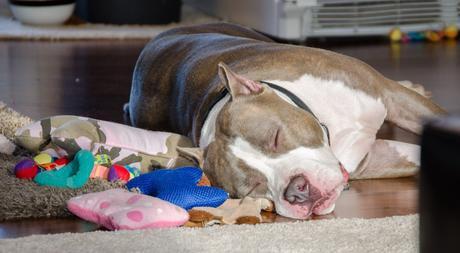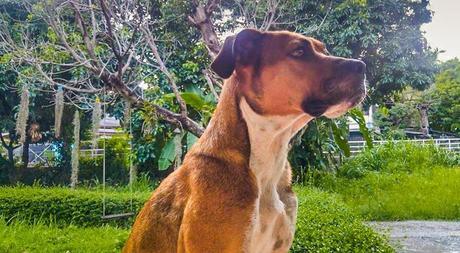 Before moving to Thailand, we struggled with the decision to bring our cat and dog with us. We questioned whether owning pets in Thailand would be anything like owning pets in the USA. At the time we were researching our move (2012), we found little information on websites and forums that gave us hope or confirmed our fears.
Before moving to Thailand, we struggled with the decision to bring our cat and dog with us. We questioned whether owning pets in Thailand would be anything like owning pets in the USA. At the time we were researching our move (2012), we found little information on websites and forums that gave us hope or confirmed our fears.
Fast forward to 2016. We've spent the last three and a half years with our big ol' American cat in Chiang Mai, Thailand and had our fair share of ups and downs.
Luckily it's been relatively easy to take care of our cat in Thailand. He doesn't mind the hot weather and loves chasing bugs and lizards (both outside and inside our house). After a lot of searching via motorbike (good luck with those online listings!), we found a decent pet shop that has a good variety of everything he needs. And thanks to a friend's recommendation, we have a friendly vet who we've used for check-ups and minor emergencies. We've settled in nicely, but there are a few things we wish we'd known before committing to being pet owners in Thailand.
For starters, we had no idea just how difficult it would be to find a pet-friendly home. Let's be clear: there ARE pet friendly 4+ bedroom family houses beyond the city limits. However, we had our hearts set on living near Chiang Mai's city center but found out the hard way that apartments and condos don't allow pets.
And to think if we brought our dog, an 85 lb American Bully, we'd be pulling our hair out trying to find an affordable pet friendly residence with a fenced-in yard somewhere in town. (From one dog owner to another, a fence is a must-have, non-negotiable feature to protect your dog from Thailand's strays). Not to mention, he doesn't quite fit the 'cute, small dog' look. That'd make it a challenge to take him anywhere with us, something we were all too familiar with back in the USA.

If you want to know what pet friendly homes, daycare and boarding facilities, vets, and pet shops we've come found in Chiang Mai, sign up to be notified when our membership site goes live.
Anyways, that's just our experience. So we asked some of our fellow pet-owners to share their own stories. Here's what they had to say in response to our questions:
01 What has been your experience with veterinarian care in Thailand?
Diana lived in Chiang Mai for three years and nursed her two cats, Lucky and Penelope, back to health after rescuing them from the city streets.
Vet care in Thailand can be hit or miss - largely in part due to the language barrier.
I lived in Thailand for almost three years and worked with an animal sanctuary - Elephant Nature Park - during that time. Within my first week of living in Chiang Mai, I rescued a tiny little street kitten dying of parvo. I rushed him to the vet the park uses, Dr. Nook, who saved his life. She and her team ended up saving his life a couple of times, actually. Dr. Nook was thorough and always provided clear explanations of what was going on, not only for my cats (I ended up with two), but also when I visited her with other animals rescued. She and her staff were caring and gentle - they even consoled me when animals I cared for had to be put down.
However, not all veterinary practices are the same. I also had to rush my cat to a 24-hour hospital and he was misdiagnosed with parvo for a second time. (Oddly enough the tests, which they showed me, came back negative). It is really important to find a vet other westerners use, or a vet that the animal sanctuaries use. These tend to be the ones with the most experience and updated facilities.
02 Any funny Thailand pet stories? Any cautionary tales?
Nick and Michael have lived in Thailand for two and a half years and brought their cat, Karma, from the USA.
Karma, Michael and I arrived in Chiang Mai January 2014. When we first moved to Chiang Mai we lived on the ground floor. Our cat baby Karma is an indoor cat but a little outdoor avenger at heart. (She has a record of escaping/sneaking out and not coming back until morning.)
We noticed that some of the Chiang Mai neighborhood cats started to come around. They would stay ten feet from our screen door and meow. She would just stare at them. She never meowed. This went on for a few weeks until one day I noticed a few cats scoping out our place, looking at Karma.
I didn't really think anything of it. Until...I opened the screen door to take out the trash and Karma bolted out the door full speed. This was her big escape that she'd been planning.
I screamed for Michael. I was shocked and just stood there and didn't do a thing. Michael ran outside in his underwear, panicked. (Mind you, this is in the center of the complex so everyone can see and everyone was home because it was early evening.)
I finally ran out after him and told him to go back inside. I chased Karma down as she rounded the corner of another building. She looked lost, like she was thinking, "Where the hell am I?" I was very calm and acted like she'd done nothing wrong and snatched her up into my arms.
We thought that it was the end. Had we come all this way only for her to escape and join her stray cat friends? Or worse, eaten by the local dog gang that we affectionately called, "The Rat Pack".
Two and half years later, Karma is still enjoying Thailand and she's hasn't pulled any escape attempts since.
03 Has your view on pet ownership changed now that you live in Thailand?
Kati and Elias have lived in Thailand for two years and bought their dog, Dara, in Chiang Mai when she was a puppy.
Sure, my view on pet ownership has changed. As an American, we often obsess over the things we do, which includes taking care of our pets. We're told that our dog or cat must get their shots on a regimented schedule and that we must buy them the most expensive, high-end food. Otherwise we're reprimanded or labeled as horrible pet parents. In the US, it's not uncommon to be pressured into spending money on the best of the best but it's nothing like that in Thailand.
In the US, there's also this mentality of hyper commitment. Yes, owning a dog is a commitment, but my world doesn't revolve around my dog, Dara. I adopted her after moving to Thailand and I don't think of taking care of her - from feeding and giving her attention to the daily walks and yearly vet checks - as a life-consuming task. There's a more a relaxed attitude in the Thailand courtesy of the 'sabai sabai' mentality. I can make sure my dog is healthy and happy without going overboard.
04 What's the hardest or easiest thing about owning pets in Thailand?
Alana received her dog, Manee, as a gift a year after moving to Thailand.
I had never had a pet before so I don't know what it would be like to have my dog in another country. But compared to my hometown of Seattle, Thailand doesn't seem particularly pet-friendly or accessible.
In Chiang Mai, for instance, it's difficult to walk your dog because they aren't allowed in the public parks. However, some owners pretend not to see the signs and sneak them in anyway. There aren't any great spaces for walking and especially not for letting a dog off a leash.
Transportation can get tricky to if you rely on a motorbike. I sometimes ride with my dog on the bike with me but I couldn't if she was much bigger.
05 What is the biggest difference in pet culture compared to your home country?
We rescued our cat, MooShu, from an animal shelter in the USA and brought him to Thailand.
There's a difference in owning pets in Thailand, most notably in breed preferences and treatment.
Breeds such as French Bulldogs, Pugs, Chihuahuas, Terriers, Spaniels, as well as any toy dog breeds, are very popular. There is ample affection, toys, food, and other general resources for small dogs. It's common to see them well-groomed, sometimes to the point of being dolled up with bows or flashy collars. It's arguably quite cute! Every once in a while we see them carried around in fashionable doggie carriers or held in their owner's arms like infants. However, Thailand doesn't seem to be as pet friendly towards cats or large dogs. In In America, on the other hand, cats and dogs (of all sizes) seem to be enjoyed relatively equally.
Also, many Thais look down on neutering/spaying and (especially) euthanasia. Although there are animals rescue centers that accept 'donations' of street dogs and cats, there are still hordes of intact strays roaming around who are too often rarin' to reproduce. The sheer number of strays is both a nuisance (adjusting your route to avoid going by territorial dogs, especially if you are taking your own dog for a walk) and a danger (getting into a car or motorbike accident because a stray dashed in front of your vehicle). This is opposite to the USA, in which strays are promptly picked up by a government service and put in a shelter and eventually put down if they aren't adopted out.
If you own a pet in Thailand, what has your experience been like? Leave a comment below.
